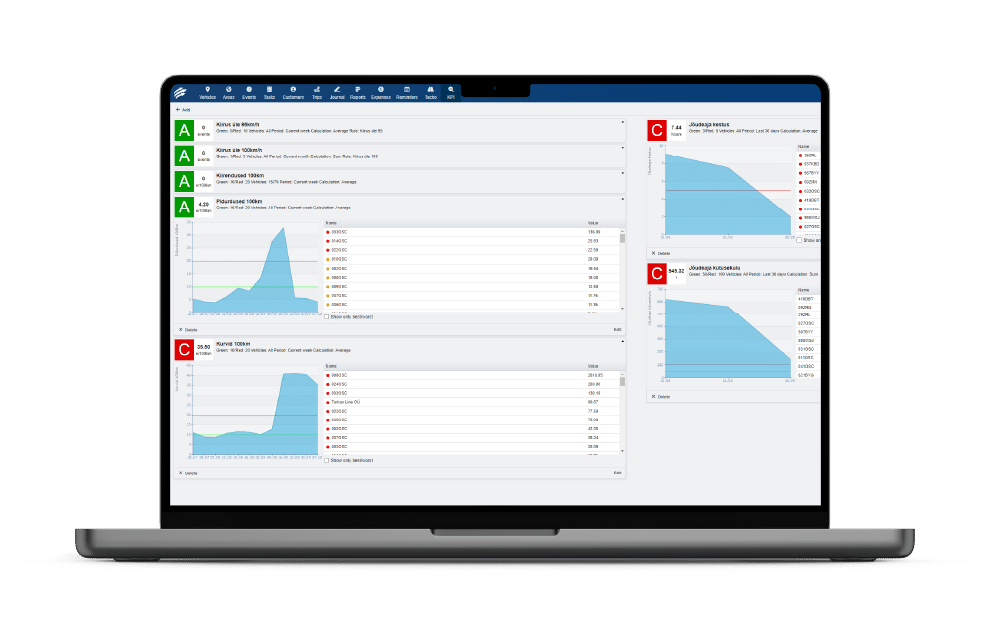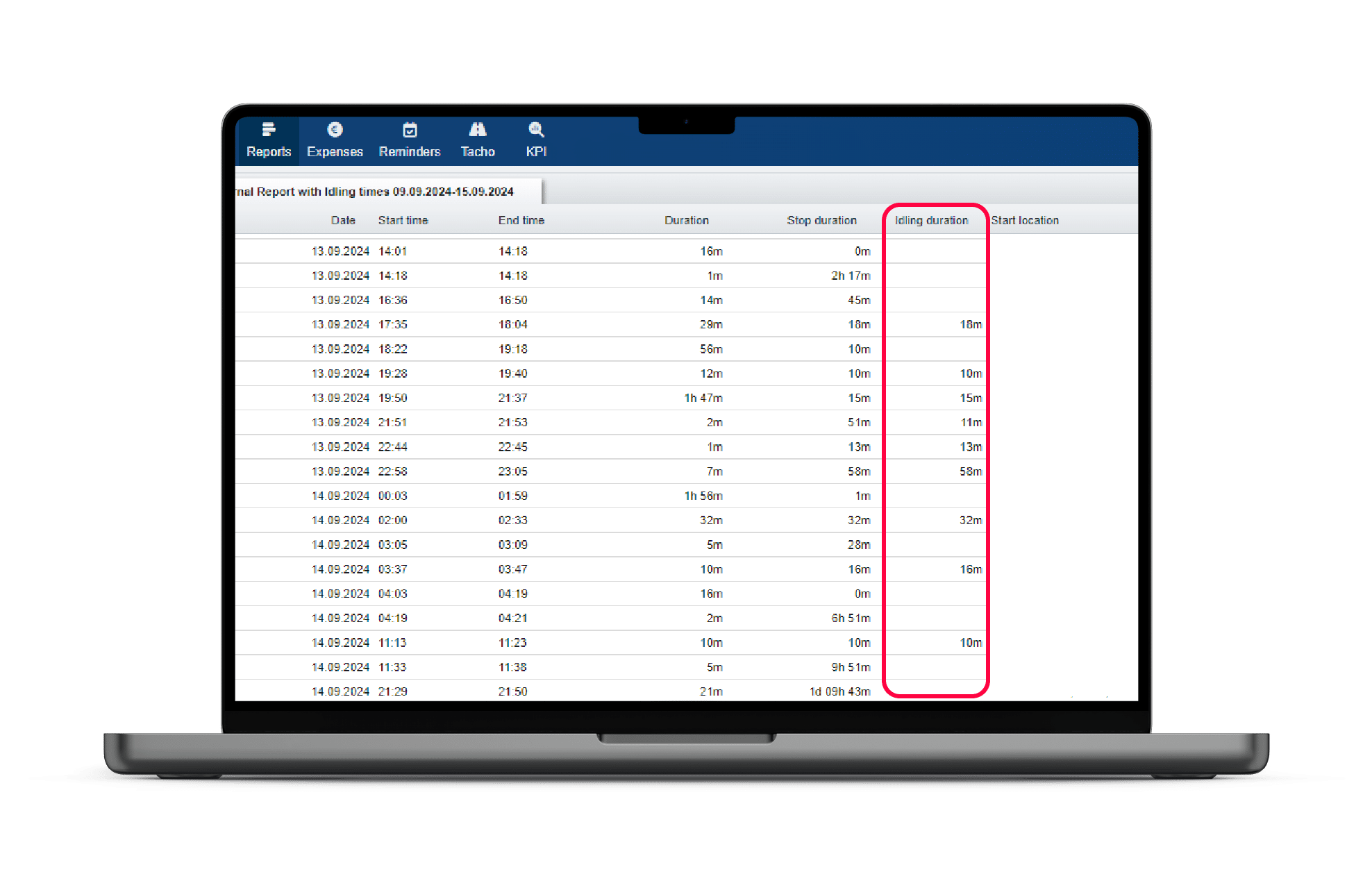ESG-RAPPORTERING FOR VIRKSOMHEDER MED FLÅDESTYRING
Telematik-løsninger gør det muligt for virksomheder, der styrer køretøjsflåder og mobile arbejdsstyrker, at indsamle præcise og pålidelige data til ESG-rapportering (miljømæssig, social og ledelsesmæssig rapportering).

Præcise data til ESG-rapportering
For at opfylde ESG-standarder kræves præcis indsamling af data. Dette er blevet afgørende for succesrige virksomheder. Telematik-løsninger hjælper virksomheder med at analysere effektiviteten og miljøpåvirkningen af deres køretøjsflåder, og muliggør dermed realistiske og fremadskuende ESG-mål. Disse løsninger understøtter også løbende overvågning, styring og rapportering af resultater. Fleet Complete leverer præcise og pålidelige oplysninger, der hjælper med at træffe bæredygtige beslutninger og styrke virksomhedens sociale ansvar.
Hvad er ESG?
Den centrale ramme for ESG-rapportering i Europa er Corporate Sustainability Reporting Directive (CSRD), som udvider og erstatter det tidligere Non-Financial Reporting Directiv (NFRD). ESG-rapporter giver et omfattende overblik over virksomhedens aktiviteter, der påvirker samfundet, miljøet og ledelsen, og tilbyder strategisk retning til at nå bæredygtighedsmål.
Hvornår træder rapporteringskravet det i kraft?
- 2024: Virksomheder, der allerede rapporterer under de gamle regler, skal opfylde CSRD-kravene.
- 2025: Store virksomheder, der tidligere ikke var forpligtet til at rapportere, vil begynde ESG-rapportering.
- 2026: Mindre børsnoterede virksomheder og finansielle institutioner vil begynde rapportering.
Hvem skal rapportere?
- Store virksomheder i EU: Virksomheder skal rapportere, hvis de opfylder to af følgende kriterier:
Årlig omsætning overstiger 40 millioner euro.
Aktiver overstiger 20 millioner euro.
Flere end 250 medarbejdere. - Børsnoterede virksomheder: Alle børsnoterede virksomheder i EU, undtagen små virksomheder med færre end 10 medarbejdere eller en omsætning under 700.000 euro.
- Ikke-EU virksomheder: Ikke-EU virksomheder skal rapportere, hvis de har væsentlig aktivitet i EU (salg over 150 millioner euro).
- Små og mellemstore virksomheder (SMV’er): SMV’er på offentlige markeder har forenklede rapporteringsregler indtil 2028.
Hvorfor er ESG vigtigt?
ESG er ikke kun et krav om overholdelse, men også et strategisk værktøj til at opbygge bæredygtige og socialt ansvarlige virksomheder. I dag fokuserer investorer, kunder og andre interessenter i stigende grad på virksomheders præstationer inden for miljømæssige, sociale og ledelsesmæssige områder. For organisationer, der er afhængige af køretøjsflåder, er præcise og pålidelige oplysninger om miljøpåvirkninger, sociale praksisser og ledelsesprincipper afgørende. Telematik spiller en vigtig rolle her ved at understøtte datadrevet beslutningstagning og opnåelse af ESG-mål.
Telematik-løsningens rolle i ESG-rapportering
Telematik leverer realtidsdata om køretøjsflåder og mobile arbejdsstyrker, og giver virksomheder de nødvendige oplysninger til ESG-rapportering. Disse data gør det muligt for virksomheder at træffe informerede beslutninger, der overholder lovgivningsmæssige krav og samtidig fremmer bæredygtighed og virksomhedens ansvar.

OPSÆTNING OG OPNÅELSE AF MÅL
Telematik-løsninger gør det muligt for virksomheder at opstille og spore nøglepræstationsindikatorer (KPI’er), der er i overensstemmelse med de overordnede forretnings- og ESG-mål. Eksempler på dette kunne være reduktion af brændstofforbrug, minimering af tomgangstid, optimering af ruter og forbedring af flådens bæredygtighed. Telematik leverer væsentlige data til at overvåge fremskridt og opnå fastsatte mål. Ved at bruge flådedata kan virksomheder implementere strategiske initiativer såsom føreruddannelsesprogrammer, flådeoptimering, bildelingsløsninger og yderligere ruteoptimering. Disse tiltag forbedrer effektiviteten, fremmer bæredygtighed og øger kundetilfredsheden.


FORBEDRING AF MEDARBEJDERSIKKERHED OG ANSVARLIG KØRSEL
Den sociale del af ESG omfatter sikring af medarbejdernes sikkerhed og trivsel. Ved at overvåge kørselsadfærd, såsom overholdelse af hastighedsgrænser, hårde opbremsninger og accelerationer, kan data identificere områder, der kræver forbedring. Disse data understøtter målrettede træningsprogrammer, der fremmer sikrere og mere ansvarlig kørsel. Resultatet er færre ulykker, forbedret medarbejdersikkerhed og dokumenteret omsorg for arbejdsstyrkens trivsel.

OPTIMERING AF FLÅDEDRIFT
Optimering giver mulighed for mere effektiv drift og bidrager samtidig til bæredygtighedsmål. Telematik-løsninger forbedrer flådestyring ved at koordinere mobile arbejdsstyrkeopgaver, planlægge ruter og strømline aktiviteter. Ved at analysere bevægelsesmønstre, opgavernes gennemførelsesprocenter og køretøjsanvendelse tilbyder telematik praktiske løsninger til opgavestyring, ruteoptimering og effektiv arbejdsstyrkebrug. Resultatet er reduceret brændstofforbrug, lavere emissioner og øget produktivitet.

OVERVÅGNING AF CO2-UDLEDNING
Et bæredygtigt miljø er en kritisk del af ESG-målene. Telematik-løsninger gør det muligt at overvåge køretøjers CO2-udledning og hjælper med at identificere køretøjer og aktiviteter med den største miljøbelastning. Disse værktøjer vurderer køretøjseffektivitet, tomgangstider og de mest omkostnings- og miljøskadelige køretøjer eller kørestile. Effektivt forvaltede flåder er mere miljøvenlige. Ved at udnytte realtidsdata kan virksomheder identificere flaskehalse og anvende grønnere praksisser, hvilket forbedrer bæredygtighed og reducerer miljøpåvirkninger.

IMPLEMENTERING AF BILDELING
Bildeling er en effektiv måde at forbedre flådens udnyttelse og reducere emissioner på. Telematik-løsninger leverer realtidsdata om køretøjernes tilgængelighed og brug, hvilket hjælper med at optimere flådens anvendelse. Denne tilgang giver virksomheder et klart overblik over, om antallet af køretøjer svarer til de faktiske behov.
SYSTEMINTEGRATION
Effektiv ESG-rapportering afhænger af en problemfri integration af data fra forskellige kilder til en samlet og omfattende rapport. Hvis rapporteringsdata kommer fra flere systemer, er vores Proservice-udviklingsteam klar til at levere skræddersyede integrationsløsninger. Uanset om det drejer sig om integration af GPS-sporingsdata med ERP-systemer eller omvendt, er vores mål at sikre, at alle væsentlige data er let tilgængelige og effektivt anvendelige.
DOWNLOAD FCPLUS-APPEN PÅ DIN SMARTPHONE!
Powering sustainable fleets!
Få et klart overblik over alle dine værdigenstande!



